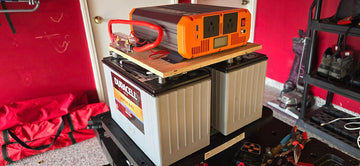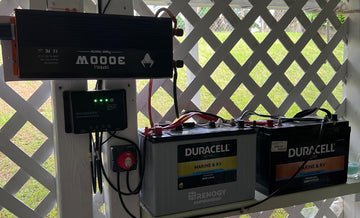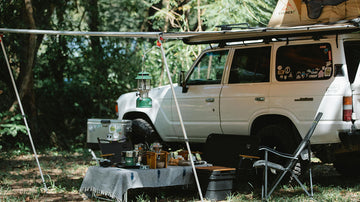The motorhome (RV) is becoming increasingly popular for modern travel. It not only offers flexible travel options, but also provides travelers with a comfortable living environment. The RV refrigerator, as an important part of this, not only keeps food fresh, but also improves the overall comfort of the trip. However, many RV owners often ask before they leave, “Can an RV refrigerator be battery-powered while traveling?” This article will delve deeper into this question to help you better plan for power management while traveling in your RV.
Table of contents:
Understanding the Types of RV Refrigerators
There are usually several types of RV refrigerators, each with its own unique working principle and applicable scenarios:
1. Absorption refrigerators
Principle of operation: Absorption refrigerators rely on the circulation of ammonia gas, which is produced by heating an ammonia-water mixture, after which the gas is cooled in a condenser and changed to a liquid. The evaporation of the gas results in a cooling effect.
Advantages:
- Quiet operation with no moving parts.
- Multiple energy supply options, which can usually be natural gas, AC or DC.
Disadvantages:
- Cooling is slow, especially in hot environments.
- Performance may suffer for inclined or bumpy roads.
2. Compressor Refrigerators
Principle of operation: compressor refrigeration refrigerators use a compressor to achieve refrigeration by compressing refrigerant. The compressor compresses the gas in the evaporator into a high-pressure gas, which is then sent to the condenser to cool it, and finally transforms it into a liquid again and re-circulates it.
Advantages:
- Fast refrigeration, able to reach the desired temperature quickly.
- Higher efficiency, especially in high temperature environments.
Disadvantages:
- Usually requires frequent AC power supply.
- Noisy, as the compressor has mechanical noise in operation.
3. Portable refrigerator
Principle of operation: usually works on the compressor or thermoelectric (Peltier effect) principle, and can be powered by batteries, car cigarette lighter or AC power supply.
Advantages:
- Lightweight design, suitable for short trips or camping.
- Easy to move and store.
Disadvantages:
- Capacity is usually small for short-term use.
- Constant power demands may cause rapid battery depletion.
RV Electrical Systems
The RV electrical system is a complex and critical system that ensures that the RV provides the necessary electrical support to its occupants in a variety of environments. The system typically consists of several key components, including batteries , generators, solar panels , and associated power distribution and control equipment.
Batteries:
Batteries are the core energy storage unit in an RV electrical system. They are capable of providing power to various devices in the RV such as the refrigerator, lighting, air conditioning, and entertainment systems without an external power source. Common types of batteries used in RVs include lead-acid, lithium-ion and gel batteries. Each type of battery has its own unique performance, advantages and disadvantages, and users should weigh their choices against their specific needs and budget.
Generator:
The generator is another important part of an RV's electrical system. It is capable of converting the chemical energy of a fuel (such as gasoline or diesel) into electrical energy, thus providing a steady supply of electricity to the RV. The power and capacity of a generator varies by brand and model, and users should choose the right generator according to their power needs and RV configuration. It is worth noting that when using a generator, you should ensure that it is well ventilated and follow the manufacturer's guidelines for use and maintenance to ensure safety and prolong service life.
Solar panels:
Solar panels are an increasingly popular way of utilizing renewable energy in RV electrical systems. They are capable of converting solar energy into electricity to provide green, eco-friendly power support for RVs. The efficiency of solar panels and the amount of power they generate depends on factors such as their area, conversion efficiency and lighting conditions. In order to maximize the utilization of solar energy, users can choose to install highly efficient solar panels and reasonably plan their layout and angle. In addition, equipment such as solar controllers and storage batteries can be equipped for solar energy storage and regulation.
Power distribution and control equipment:
RV electrical systems also include a range of power distribution and control equipment such as inverters , chargers , circuit breakers, outlets and switches. These devices ensure proper distribution and effective control of power, thereby protecting the circuits and equipment inside the RV from damage. Inverters are able to convert the DC power from the batteries into AC power for some of the devices in the RV that require AC power. The charger is responsible for charging the battery to ensure that it maintains a certain level of charge without an external power source. Circuit breakers and switches protect circuits and equipment by shutting off power in the event of an overload or short circuit.
How RV Batteries Work
RVs usually come with a main battery and an auxiliary battery. The main battery is primarily used to start the engine, while the auxiliary battery is responsible for powering household appliances, including the refrigerator. The auxiliary battery can be recharged by the engine's generator while driving, ensuring that the refrigerator gets the power it needs while traveling.
RV batteries are mostly deep-cycle or lithium-ion batteries , which are characterized by high energy storage and long cycle life. While traveling, the vehicle engine charges the batteries through the generator, a process known as “on-the-road charging”. However, batteries have limited energy storage capacity and are affected by factors such as ambient temperature and battery aging.
In order to keep a refrigerator running, it is necessary to ensure that the battery has enough power. At the same time, the energy consumption of the refrigerator also affects the battery life. In general, compression refrigerators consume more energy than absorption refrigerators, so when choosing a refrigerator type, you need to consider its need for battery power capacity.
Feasibility of power supply while driving
RV refrigerators can indeed run on batteries while driving, but the specifics will depend on the type of refrigerator, battery capacity, and driving conditions.
For compression type refrigerators, if the battery capacity is large enough and the generator is able to effectively charge the battery while driving, then the refrigerator can run on the battery to some extent. However, long periods of driving or high-energy operation may quickly deplete the battery, so it is recommended that they be used in conjunction with an auxiliary power source such as a generator or solar panels.
In the case of absorption refrigerators, they are more energy efficient while driving as they do not rely on an electric compressor. However, it should be noted that absorption refrigerators usually require an external heat source to drive them, which may affect their cooling effect if they are driven too fast or if the ambient temperature is too low.
RV Energy Saving and Optimization Suggestions
In order to extend battery life and safeguard refrigerator operation, here are some energy saving and optimization suggestions:
- Adjust the refrigerator temperature setting: Set the refrigerator temperature within a reasonable range to avoid too low or too high resulting in increased energy consumption.
- Arrange food appropriately: Keep the inside of the refrigerator neat and tidy to avoid excessive accumulation of food that may affect the cooling effect.
- Use energy-efficient refrigerators: Choose refrigerator products with high energy-efficiency ratings to reduce energy consumption.
- Manage the power system efficiently: Arrange power usage appropriately when driving and parking, and avoid turning on multiple high energy-consuming devices at the same time.
- Consider solar assisted systems: Install solar panels to charge batteries and increase power sources.
Many RV travelers have already gained extensive experience in power management. For example, some travelers choose to turn off the refrigerator while driving to reduce energy consumption, and use a generator or inverter to power the refrigerator while parked. In addition, some travelers use solar panels to charge their batteries, ensuring that they can keep their refrigerator running even when they are away from utility power.
When choosing a caravan refrigerator, due consideration should be given to its energy consumption, cooling effectiveness and the need for an electrical system. Also, regular maintenance of the battery and electrical system is key to keeping the refrigerator running.
Conclusion
Overall, RV refrigerators can effectively use battery power to provide food and drink freshness while driving. However, owners need to pay attention to power management, choose the refrigerator type wisely, and make full use of the auxiliary power source. In the future, as battery technology continues to advance, I believe the RV will become more efficient and convenient in terms of power supply, providing better service to travelers.
FAQs
How is an RV refrigerator different from a home refrigerator?
RV refrigerators are typically designed to be more compact to fit into the limited space inside an RV. They also come with a variety of power options (e.g., AC, DC, and propane gas) to accommodate different traveling environments. Additionally, RV refrigerators are often shock and vibration resistant to ensure that they will still function properly while traveling.
How much power supply does an RV refrigerator need?
The power requirements of an RV refrigerator depend on its model, capacity and cooling efficiency. Generally, smaller single-door refrigerators consume less electricity, while larger two- or three-door refrigerators may require more. When choosing an RV refrigerator, it is recommended to check its electrical specifications and make sure that your RV electrical system is capable of meeting its needs.
Can RV refrigerators be powered by solar panels?
Yes, many RV refrigerators support solar panel power. By installing solar panels, you can power your RV refrigerator away from utility power. However, it's important to note that the efficiency of solar panels is affected by weather and lighting conditions, so additional batteries or a generator may be needed as a backup power source.
How do I make sure my refrigerator has enough power when driving long distances?
While driving, the main battery will charge the auxiliary battery to ensure that the refrigerator gets enough power. It is also recommended to check the battery status regularly.
Can I use the refrigerator without starting the engine?
If the refrigerator is designed to be powered by a 12V battery, it can be run for a short period of time while the vehicle is turned off, but it is best to avoid this to avoid draining the battery too quickly.
What can I do to optimize the refrigerator's power consumption while driving?
Pre-cool the fridge using a condensate (e.g. ice cubes or ice packs), set the appropriate temperature and minimize the number of times you open the fridge door while driving.

















